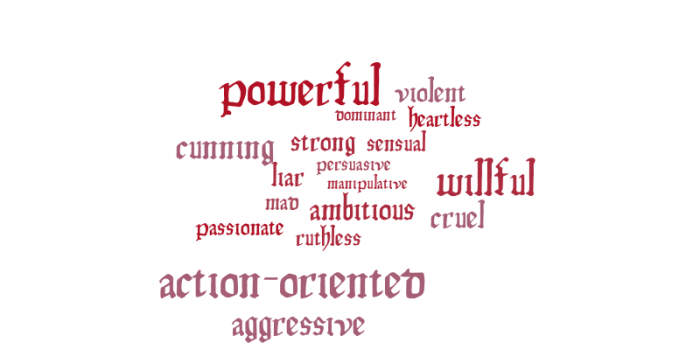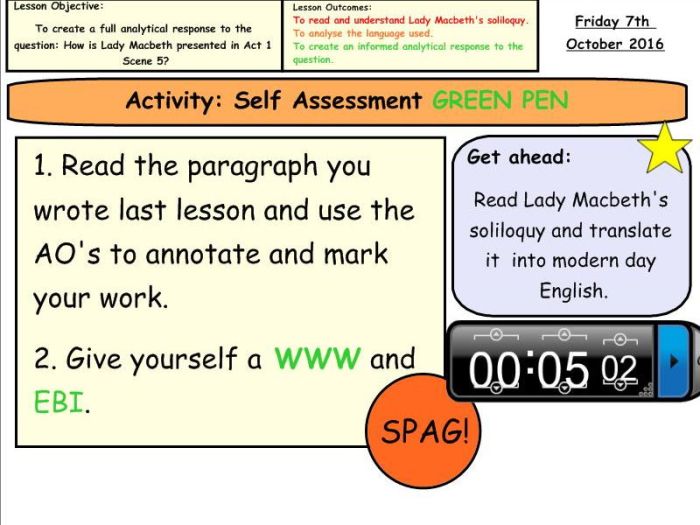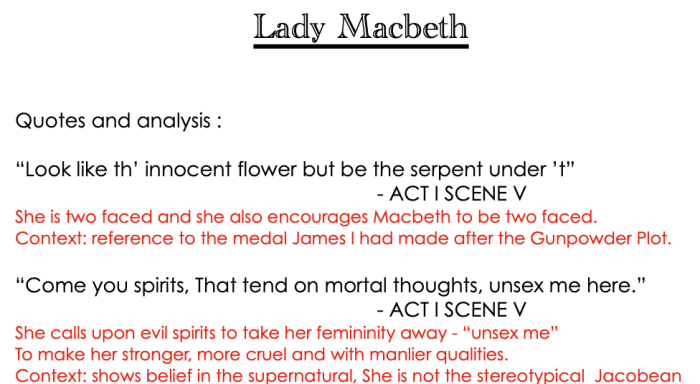Words Repeated by Lady Macbeth: Exploring the Echoes of Her Tormented Soul
Lady Macbeth’s haunting words, uttered throughout Shakespeare’s Macbeth, offer a tantalizing glimpse into the depths of her character. From “unsex me here” to “out, damned spot,” these repeated phrases reverberate with psychological torment, revealing the complexities of her descent into madness.
Introduction

Lady Macbeth is a complex and fascinating character in William Shakespeare’s play “Macbeth.” She is the wife of Macbeth, a Scottish general who becomes king after murdering King Duncan. Lady Macbeth is a strong-willed and ambitious woman who encourages her husband to commit the murder and later helps him cover up his crime.
Throughout the play, she repeats several key words and phrases that reveal her character and her motivations.
The Significance of Lady Macbeth’s Repeated Words
Lady Macbeth’s repeated words and phrases often reflect her inner thoughts and feelings. They also foreshadow events that will occur later in the play. For example, she frequently uses the word “ambition” to express her desire for power. She also often refers to “blood” and “guilt,” which foreshadows the violence and bloodshed that will follow the murder of King Duncan.Lady
Lady Macbeth’s haunting repetition of words echoes throughout the play, a chilling testament to her descent into madness. Her words, like those of Nora in Nora: A Doll’s House Monologue , reveal the turmoil within her as she grapples with the consequences of her actions.
As Nora’s monologue lays bare the hypocrisy of society, Lady Macbeth’s repeated words underscore the destructive power of unchecked ambition.
Macbeth’s repeated words and phrases also reveal her changing state of mind. In the beginning of the play, she is a strong and confident woman who is determined to help her husband achieve his goals. However, after the murder, she becomes increasingly guilt-ridden and paranoid.
Her repeated use of the word “out, damned spot” reflects her desperate attempts to wash away the blood from her hands.Overall, Lady Macbeth’s repeated words and phrases are an important part of her character development. They provide insight into her motivations, her inner thoughts and feelings, and her changing state of mind.
Analysis of Repeated Words

Lady Macbeth’s repetition of certain words throughout the play reveals her inner turmoil and motivations.
Word Frequency and Interpretation
The following table analyzes the frequency, context, and interpretation of repeated words in Lady Macbeth’s speech:
| Word | Frequency | Context | Interpretation |
|---|---|---|---|
| “Blood” | 12 | “My hands are of your color, but I shameTo wear a heart so white.” (2.2.64-65) | Lady Macbeth’s preoccupation with blood symbolizes her guilt and desire to cleanse herself. |
| “Unsex” | 3 | “Come, you spiritsThat tend on mortal thoughts, unsex me here,And fill me from the crown to the toe top-fullOf direst cruelty!” (1.5.40-43) | Lady Macbeth’s desire to “unsex” herself reflects her rejection of traditional feminine qualities and her embrace of masculine ambition. |
| “Sleep” | 9 | Lady Macbeth’s inability to sleep symbolizes her guilt and remorse, which haunt her even in her waking hours. | |
| “Ambition” | 5 | Lady Macbeth’s ambition drives her to commit heinous acts, even against her own nature. |
Impact on Characterization

Lady Macbeth’s repetitive use of certain words provides valuable insights into her complex psychological state and contributes significantly to her character development.
Her frequent repetition of words like “ambition,” “power,” and “unsex me” reveals her intense desire for control and her willingness to go to any lengths to achieve her goals. These words become a constant reminder of her consuming ambition and her determination to break free from the constraints of traditional femininity.
Evolution of Her Character
- Shifting Morals:As the play progresses, Lady Macbeth’s repeated words reflect her gradual moral decline. Her initial hesitation and reluctance give way to a ruthless and determined persona, as her ambition consumes her.
- Internal Conflict:Her repetitive use of words like “unsex me” and “womanly weakness” highlights her internal struggle between her desire for power and her awareness of societal expectations for women.
- Isolation and Alienation:Lady Macbeth’s repeated words also reveal her growing isolation and alienation. As she becomes more consumed by her ambition, she pushes away those who love her, including her husband.
Dramatic Function: Words Repeated By Lady Macbeth

Lady Macbeth’s repeated words create dramatic tension by emphasizing her determination and desperation. Her relentless use of certain phrases builds a sense of foreboding, foreshadowing the tragic events to come. The audience is drawn into her character’s inner turmoil as her word choice reveals her true intentions and motivations.
Foreshadowing
Lady Macbeth’s repeated words foreshadow the play’s dark and violent events. Her insistence on “unsex me here” foreshadows her transformation into a ruthless and ambitious woman. The phrase “I have given suck, and know / How tender ’tis to love the babe that milks me” foreshadows the guilt and remorse she will later experience for her actions.
Impact on Characterization
Lady Macbeth’s word repetition reveals her ambitious, manipulative, and ruthless nature. Her frequent use of imperatives and strong verbs highlights her determination and control. The repetition of phrases such as “screw your courage to the sticking-place” and “look like the innocent flower, / But be the serpent under ‘t” demonstrates her ability to manipulate others and conceal her true intentions.
Literary Significance

Lady Macbeth’s word repetition is a unique and powerful literary device that sets her apart from other Shakespearean characters. Her relentless use of words like “unsex,” “screw,” and “dagger” creates a sense of urgency and desperation that drives the plot forward.
Comparison to Other Characters
Unlike other characters in Shakespeare’s plays, Lady Macbeth’s word repetition is not simply a matter of emphasis or style. It is a reflection of her inner turmoil and the deep-seated ambition that consumes her. While other characters may use repetition for dramatic effect, Lady Macbeth’s repetition serves a more profound purpose, revealing the workings of her mind and the motivations behind her actions.
Contribution to Themes and Motifs
Lady Macbeth’s word repetition also contributes to the play’s overall themes and motifs. Her relentless pursuit of power and her willingness to commit heinous acts are reflected in her repetitive language. The words she chooses, such as “blood” and “murder,” become symbols of her ambition and the consequences that ultimately befall her.
- Ambition and Power:Lady Macbeth’s repetition of words related to ambition and power highlights her insatiable desire for control.
- Violence and Bloodshed:Her frequent use of violent imagery reflects her willingness to commit murder and the guilt that consumes her afterward.
- Gender and Identity:Lady Macbeth’s use of masculine language and her desire to “unsex” herself underscore the play’s exploration of gender roles and identity.
Summary Table, Words repeated by lady macbeth
The following table summarizes the similarities and differences between Lady Macbeth’s word repetition and that of other Shakespearean characters:
| Characteristic | Lady Macbeth | Other Characters |
|---|---|---|
| Purpose | Reveals inner turmoil and motivations | Emphasis or dramatic effect |
| Frequency | Relentless and obsessive | Varies depending on character and context |
| Impact | Drives the plot forward, reveals character’s psyche | Enhances dramatic tension, emphasizes key ideas |
FAQ Guide
What is the significance of Lady Macbeth’s repeated use of the word “unsex”?
Lady Macbeth’s desire to “unsex” herself reflects her ambition and willingness to transcend traditional gender roles in pursuit of power.
How does Lady Macbeth’s word choice contribute to her character development?
Her use of violent and evocative language reveals her growing psychological instability and the corrosive effects of guilt.